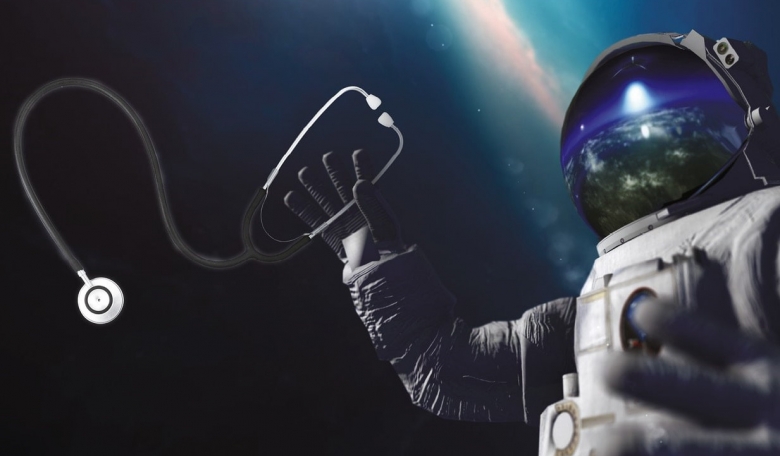Space exploration is pushing the boundaries of human capabilities like never before. As astronauts spend longer periods of time in microgravity environments aboard the International Space Station (ISS) and future planetary missions, it is crucial that their health and well-being are properly monitored and cared for. This has led to the emergence of a specialized field known as space medicine, which aims to understand the physiological effects of spaceflight and develop ways to prevent, diagnose and treat illnesses for astronauts living and working in space.
The Challenges of Spaceflight on the Human Body
Living in microgravity presents several challenges for the human body. Prolonged periods in weightlessness can lead to muscle and bone loss, balance problems, fluid shifts,decreased production of red blood cells as well as elevated stress levels. Studies on ISS astronauts have shown that they lose approximately 1-2% of bone mineral density per month during long-duration flights. Spinal discs may also expand during spaceflight, thereby increasing risk of back injuries. Humans completely adapted to living on Earth can experience bodily changes within days when exposed to microgravity conditions.
An important focus of Global Space Medicine research involves understanding the molecular and physiological responses behind these adaptations. Studies analyze biological samples and conduct medical evaluations before, during and after space missions. The data collected helps identify countermeasures to prevent health risks and allows monitoring of real-time changes. Other challenges include restricted living space, isolation from friends and family back on Earth as well as the ever-present danger of developing medical conditions without timely access to advanced treatment facilities. Space medicine works to provide solutions for all of these issues to ensure crew safety and mission success.
Medical Operations During Missions
Each crew member undergoes extensive medical training and brings an onboard medical kit containing a variety of medications and equipment. Routine health checks and sample collections are performed usually several times a week. Vital signs like blood pressure, heart rate etc. are closely monitored for any irregularities that may signal an emerging problem. Onboard diagnostic imaging tools such as ultrasound allow basic examinations without needing to return to Earth. Telemedicine capabilities enable ground physicians to provide remote guidance and consultation to astronauts for non-emergency cases.
In a medical emergency onboard the ISS or other spacecraft, the flight surgeon works with the crew to properly diagnose and stabilize the situation through guidance from Mission Control specialists on the ground. Advanced portable medical devices permit critical interventions like suturing wounds or administering medications and vaccines. While minor issues may be addressed during flight, serious conditions usually require the patient to return to Earth at the earliest opportunity for definitive care. Rapid reentry and transport to specialized space medicine clinics ensures prompt evaluation and proper management. Strong communication between flight and ground teams is vital for on-orbit astronaut health management.
Planning for Longer Future Missions
With agencies like NASA, SpaceX, Blue Origin and others planning ambitious long-term exploration missions deeper into the solar system including Mars, the challenges of providing healthcare beyond low Earth orbit significantly increase. Resupply of medical consumables and equipment from Earth becomes incredibly difficult due to the large distances involved. Any unexpected medical need onboard could seriously jeopardize the success or safety of the mission. Therefore, space medicine aims to implement comprehensive preventive and diagnostic strategies through advanced crew monitoring systems and telehealth guidance from mission control centers.
Future spacecraft will likely carry more miniaturized diagnostics like portable ultrasound, CT and MRI scanners along with 3D printing capabilities for replacement parts. Growing food and producing pharmaceutical drugs through biofabrication methods could make crews more self-sufficient during very long transit periods between planets. Teleoperated robotic assistants may help with treatments and sample collections too far for ground personnel to directly oversee. Additionally, behavioral health must remain an area of emphasis to counter psychological stressors like isolation, confinement and risk of failure in complex missions like Mars expeditions. Incorporating more virtual reality and augmented reality could assist crew bonding and recreational activities.
Continued Research Critical for Human Space Exploration
Research in space medicine will be crucial for enabling routine access beyond Earth orbit and safeguarding astronaut health for long-term settlement on other worlds like the Moon and Mars. Studies from existing orbital crews and ground controlled analog missions will aid understanding necessary to minimize risks and maximize productivity during year-long journeys to our solar system’s distant destinations. International collaborations have been instrumental in prioritizing key knowledge gaps and facilitating data sharing.
While much progress has been made to extend human endurance in space, the challenges of living in a microgravity environment are still not fully comprehended. Cutting edge investigations using both observational and experimental approaches on future exploration class spacecraft will build on previous findings aboard the Space Shuttle and ISS. Through diligent medical operations and ongoing ground-based simulation work, we are preparing our astronauts not only to survive but thrive as the reach of humanity extends deeper into the cosmos than ever before. Step by step, the field of global space medicine will support realization of audacious human exploration goals in Earth orbit and beyond.
*Note:
1. Source: Coherent Market Insights, Public sources, Desk research
2. We have leveraged AI tools to mine information and compile it

